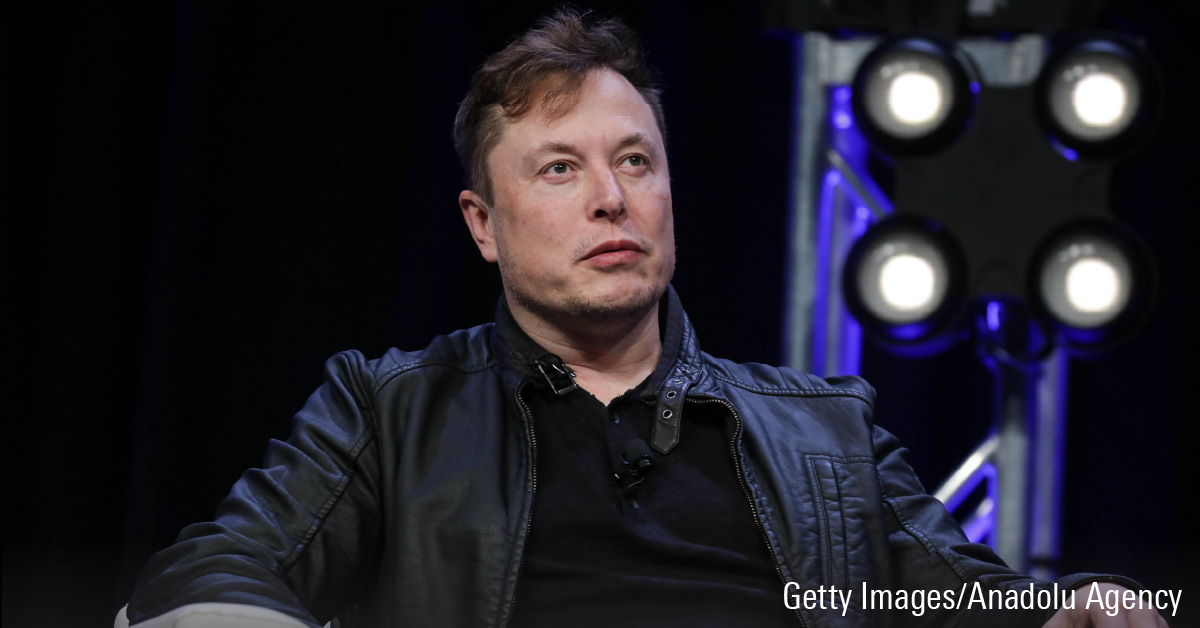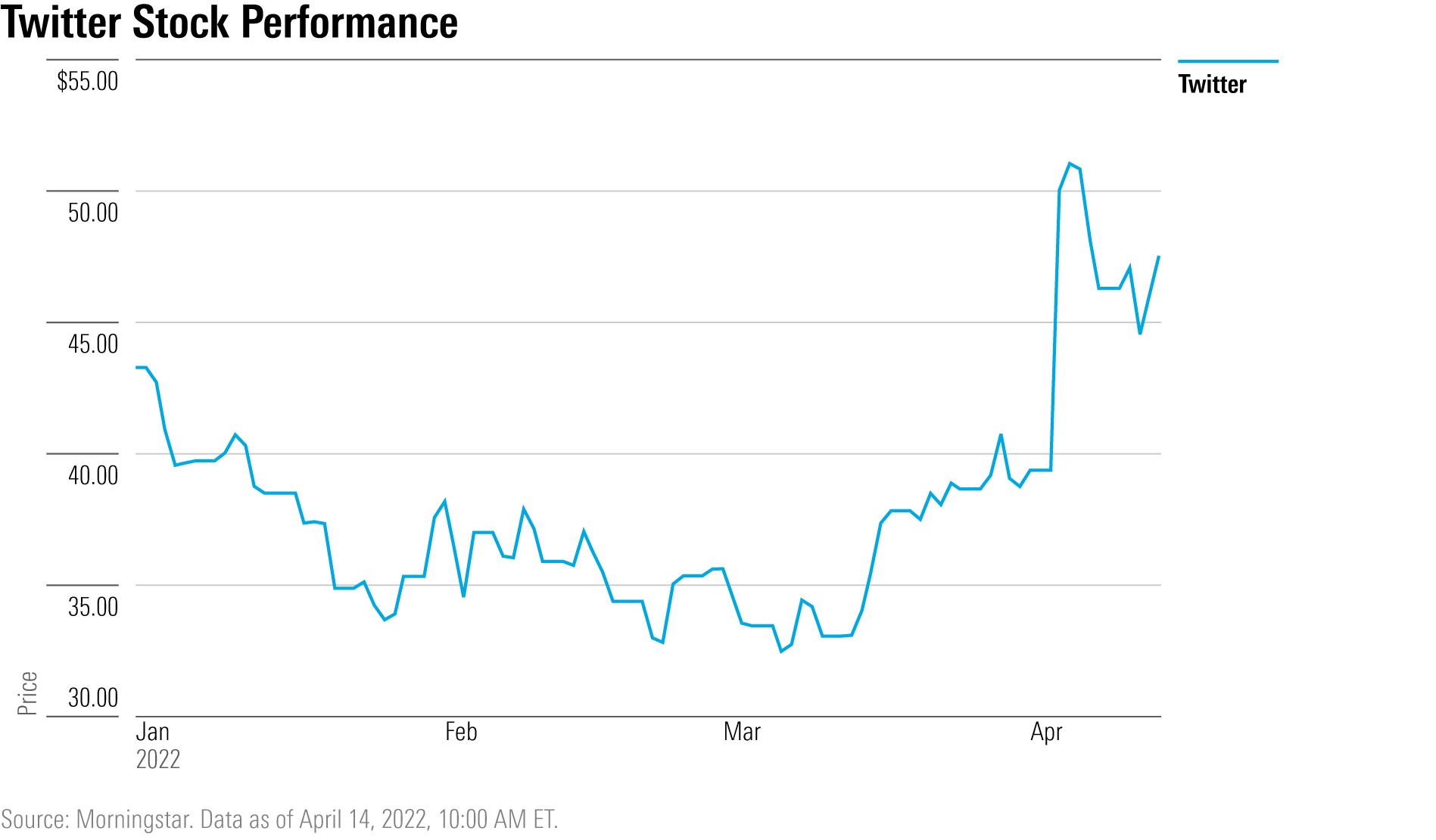Musk's Twitter Saga Escalates With $43 Billion Bid
The stock’s immediate reaction suggests investors aren’t all that impressed.

Elon Musk being Elon Musk may not succeed in him owning Twitter, but as usual, it looks like he will shake things up.
Investors are overwhelmingly underwhelmed by Musk’s offer Thursday to buy the rest of Twitter that he doesn’t already own for $54.20 a share, or $43 billion, and take the company private in defense of free speech.
Shares in the social media platform are down about 1% at $45.33 at 12pm in New York, which is well below the $58 fair value estimate Morningstar senior equity analyst Ali Mogharabi assigns to them. That’s the sound of free markets. Musk called it his “best and final offer” and said “if it is not accepted, I would need to reconsider my position as a shareholder.”
Twitter said its board would review Musk’s bid carefully and do what is in the best interest of the company and its shareholders. So far, the market is giving a loud and clear signal of what investors think.
Whatever happens now it is clear that Musk's relentless criticisms of the company may very well result in some or all of the meaningful changes he has been seeking.
Bizarre Back and Forth
Musk's bid is the latest in a recent series of bizarre back-and-forths between the Tesla chief executive and Twitter that began last Tuesday when he disclosed a 9.2% stake in the company, making him its largest shareholder.
Musk’s offer to takeover the no-moat-rated firm is "an 18% premium to where the stock closed April 13,’’ Mogharabi says.
"We believe the probability of Twitter accepting it is likely below 50%. However, we think the board may also be pondering whether it should discuss leadership changes with Musk, such as replacing CEO Parag Agrawal, as that may lessen the likelihood of Musk selling his shares if the bid is rejected,’’ Mogharabi says.

"Whether Twitter accepts the offer or Musk sells or keeps his stake in the firm, we think his influence on the platform will remain very high. However, as Musk has displayed his thirst to change Twitter mainly with regard to content moderation, some large brands may become hesitant to place ads next to what they consider may be more questionable content.’’
Active or Passive?
Musk began amassing his stake in January and ended his purchases in April, paying a weighted average price of roughly $36 a share. His holdings crossed the 5% threshold on March 14, triggering a disclosure within 10 days under regulatory rules. The capricious billionaire then continued to purchase shares beyond the 10-day timeframe and his eventual disclosure came in apparent violation of SEC rules.
Speculation ensued over whether he would be an active or passive investor. After initially suggesting he viewed his stake as passive, he was invited to join the board by Agrawal, who he’s needled consistently on Twitter. Placing Musk on the board would’ve limited ownership stake to 14.9% and curbed what he could say publicly about the company. After initially accepting the board seat, Musk declined the offer within days.
Musk, who has 81 million followers on Twitter, soon began tweeting how he would turn the company’s San Francisco headquarters into a homeless shelter and possibly rename the business Titter.
SEC Battle
Musk's Twitter moves come as he continues to battle the Securities and Exchange Commission in connection with a 2018 consent decree that calls for Tesla lawyers to approve tweets and other statements that could be material to the electric vehicle maker.
Musk came under scrutiny for tweeting on Aug. 7, 2018 that he had secured funding to take Tesla private at $420 a share.

/s3.amazonaws.com/arc-authors/morningstar/ed88495a-f0ba-4a6a-9a05-52796711ffb1.jpg)
/cloudfront-us-east-1.images.arcpublishing.com/morningstar/IORW4DN3VVC3BC4JO7AQLSJTF4.jpg)
/cloudfront-us-east-1.images.arcpublishing.com/morningstar/ODMSEUCKZ5AU7M6BKB5BUC6G5M.png)
/cloudfront-us-east-1.images.arcpublishing.com/morningstar/TGMJAWO4WRCEBNXQC6RFO5TOAY.png)
:quality(80)/s3.amazonaws.com/arc-authors/morningstar/ed88495a-f0ba-4a6a-9a05-52796711ffb1.jpg)